06/11/2025 09:33 AM
Living with constant noise from nearby roads, schools, railways, or even a neighbour’s dog or swimming pool can be frustrating. Whether it’s the hum of vehicles, machinery, or music from next door, or even just the sounds of daily life carrying over the fence, unwanted noise can make it difficult to relax and enjoy your outdoor space. Fortunately, there are effective solutions available, including acoustic fencing and other noise-reducing options.
If you’ve been wondering what’s the best fence for noisy neighbours, this guide explains how acoustic fencing works, what to consider before installing it, and why it’s one of the most effective ways to reduce noise in residential or commercial settings.
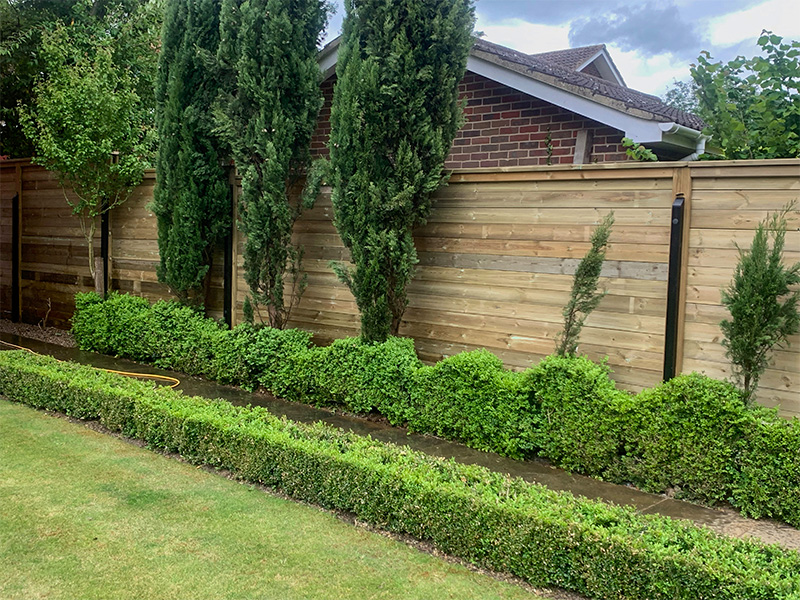
Ways to reduce the noise of your neighbours:
- Break up hard surfaces – Flat walls reflect sound. Add trellis or fencing with climbing plants or try a green roof to help absorb noise.
- Choose lawns over patios – Hard surfaces bounce sound, while lawns and planting beds help soak it up.
- Add more greenery – Thick hedges, shrubs, and trees act as natural sound barriers. Taller or pleached trees can extend noise protection above the fence line.
- Heavy duty panels – For moderate noise, heavy duty panels like our Shadowline help reflect and diffuse sound better than semi-solid designs.
- Increase fence height – Taller fences block more sound. If you can’t go higher, add trees or climbers to boost height naturally.
- Install an acoustic fence – For the most effective solution, install an acoustic fence, which can reduce noise by up to 28dB and create a noticeably quieter garden.
Together, these small changes can noticeably reduce unwanted noise. However, for a stronger and more reliable solution which is multifunctional with other benefits, acoustic fencing will have the greatest impact on sound levels in your garden, creating a calmer, more private outdoor space.
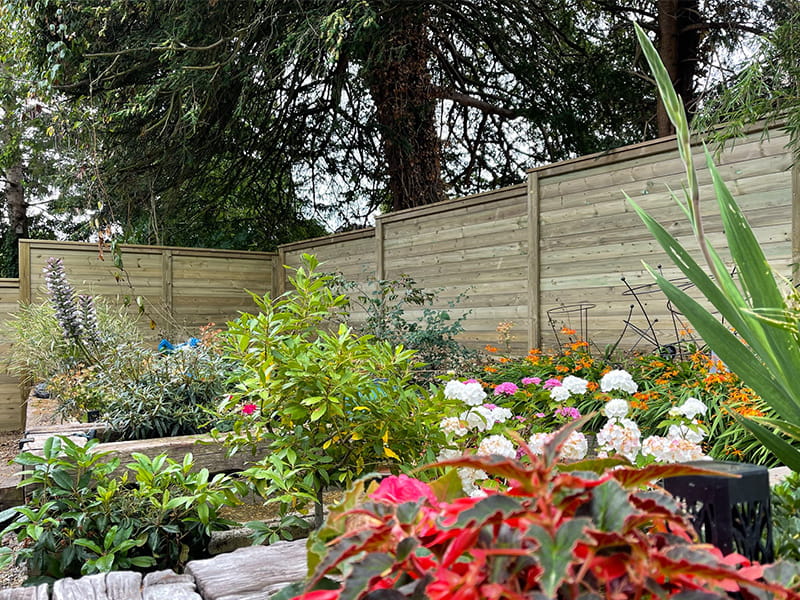
What Is Acoustic Fencing?
Acoustic fencing, sometimes referred to as soundproof fencing, is specifically designed to reduce noise transmission from one area to another. Unlike standard timber or garden fencing, acoustic barriers are engineered to reflect or absorb sound waves rather than let them pass through.
Our Jakoustic® Reflective system, for example, uses interlocking boards that fit tightly together to eliminate gaps that could allow sound to travel through. The boards’ square shaped tongues maintain a seal even as the timber naturally shrinks or expands over time, ensuring consistent acoustic performance.
This clever design makes acoustic fencing look just like a normal, attractive and sturdy timber fence, but with a hidden advantage: it significantly reduces noise levels.
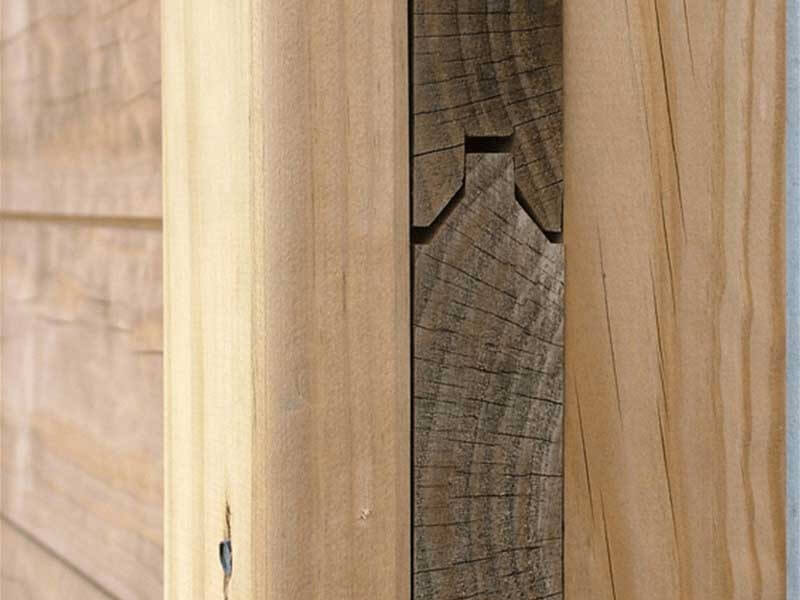
How Acoustic Fencing Works
Acoustic fences work by either reflecting or absorbing sound waves.
- Reflective systems bounce sound away from the protected area. These are ideal when there’s open space or distance for the sound to dissipate.
- Absorptive systems trap and break down sound energy within the fence itself, reducing the amount of noise that bounces back.
When installed correctly, acoustic fencing acts as a physical barrier that interrupts the path of sound waves. The result is a quieter, more peaceful environment for you and your family.
The Importance of Installing Acoustic Fencing Correctly
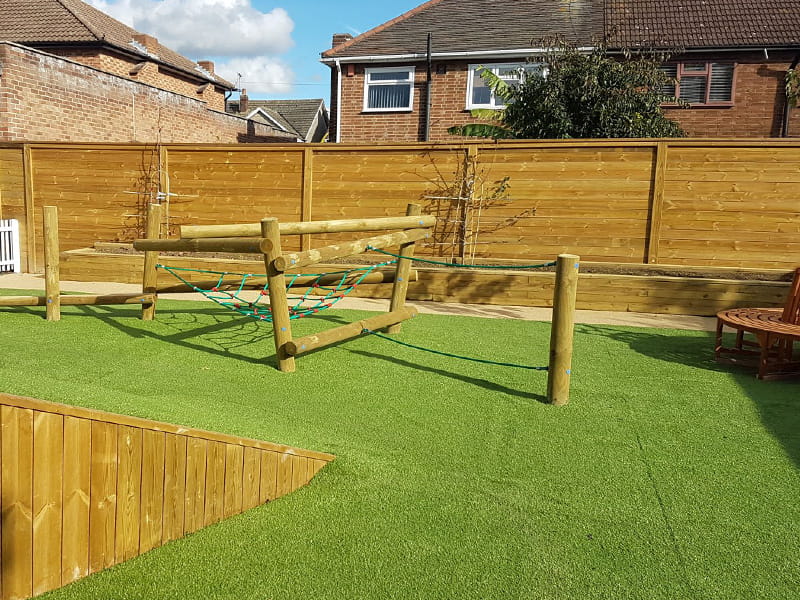
Will a Fence Really Block Out Noisy Neighbours?
A typical timber or panel fence offers only minimal noise reduction due to its lightweight structure and small gaps between boards. To achieve a noticeable difference, a purpose built acoustic fence is required.
An acoustic fence can:
- Reduce noise from neighbouring properties, roads, or nearby commercial sites.
- Increase privacy, both visually and acoustically.
- Improve comfort in gardens, playgrounds, and outdoor seating areas.
- Enhance security while maintaining a natural, unobtrusive appearance.
- Limit light pollution, as the solid, taller panels help block intrusive lighting from neighbouring gardens or street lamps.
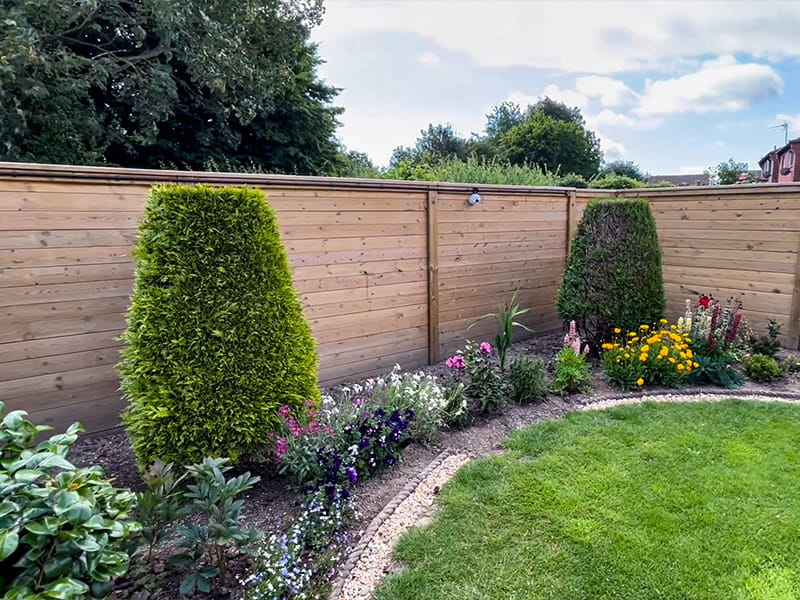
Design and Installation Considerations
Acoustic fencing is highly versatile, suitable for everything from residential gardens to schools, commercial sites, and infrastructure projects. Systems such as Jakoustic® can be stepped, or more commonly, raked, to follow uneven or sloping ground, ensuring consistent height and performance. It is always best to consult an acoustic engineer before choosing your fence height and specification.
For those who value sustainability, the design can even be made hedgehog friendly by incorporating small ground level access points without significantly affecting its acoustic properties. When selecting your fence, consider factors such as material, appearance, durability, and maintenance. Timber acoustic fencing offers a natural look, exceptional noise control, and long term resilience with minimal upkeep. Choosing an acoustic fence with the right specification ensures you get the best possible performance for your specific noise concerns.
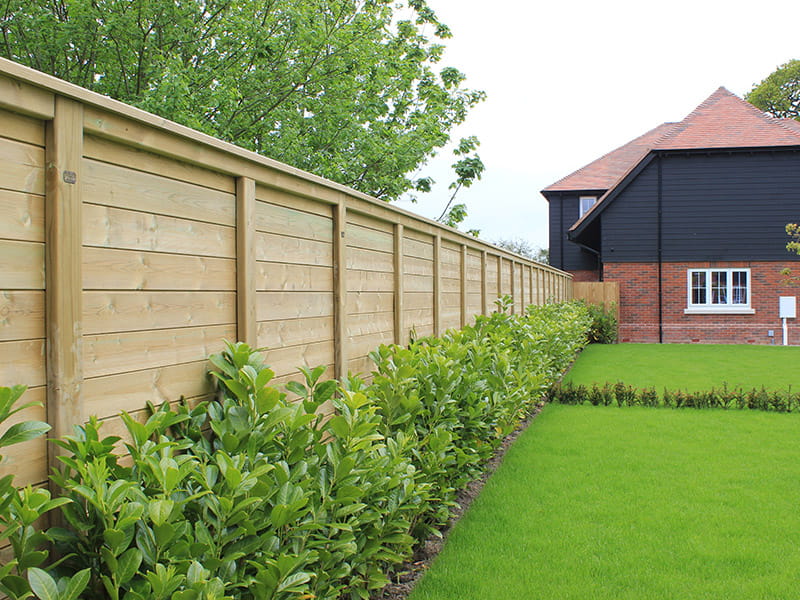
Acoustic Fencing vs. Hedges
A common question is whether a hedge or fence blocks more road or neighbour noise. While dense hedging can slightly muffle sound, it’s not as effective as a solid acoustic barrier. Hedges primarily diffuse sound rather than block it..
An acoustic fence, on the other hand, creates a solid, sealed barrier that physically interrupts the sound path. For the best of both worlds, many people combine acoustic fencing with hedging or planting in front, which softens the appearance and adds an additional layer of sound absorption. This combination not only looks attractive but also delivers the most effective noise control at the boundary.
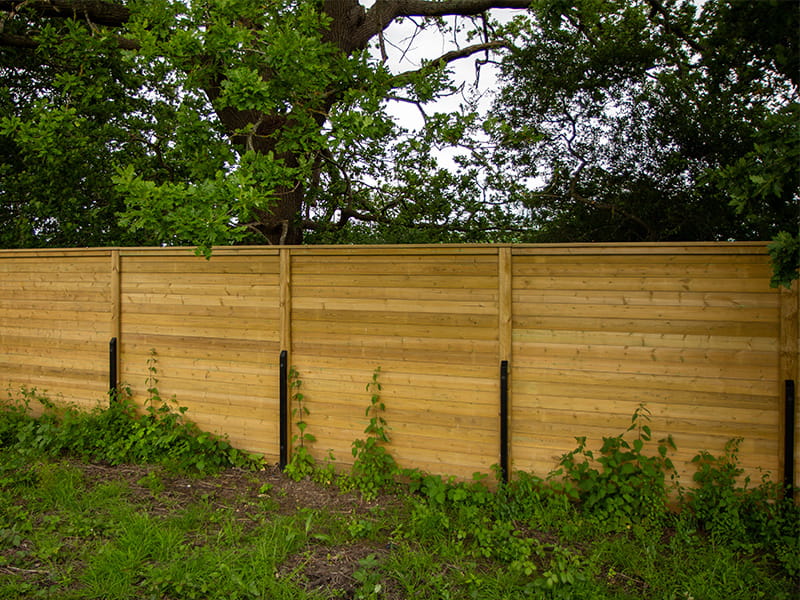
Peace of Mind with Acoustic Fencing
Whether your issue is road noise, a lively neighbour, or an active nearby school, acoustic fencing can transform your outdoor space into a peaceful retreat. With its high privacy, low visual impact, and proven noise reducing capabilities, it’s a long-term investment in your comfort and wellbeing. For those dealing with persistent neighbour noise, acoustic fencing offers the best long-term solution, combining durability with effective sound reduction.
Before installing, it is always best to consult an acoustic engineer to ensure the fence height and positioning are tailored to your property’s specific acoustic needs. Once correctly designed and fitted, you’ll notice a significant reduction in noise; allowing you to relax, unwind, and enjoy your home and garden again.
In summary, if you’re searching for the best fence for noisy neighbours, acoustic fencing is the answer. Designed to combine strength, privacy, and exceptional noise control, it’s the ideal solution for homes and businesses that value peace and quiet.
Our 12K Acoustic Fencing can be purchased online and calculated below:
Related content:
Does Acoustic Garden Fencing Work?
